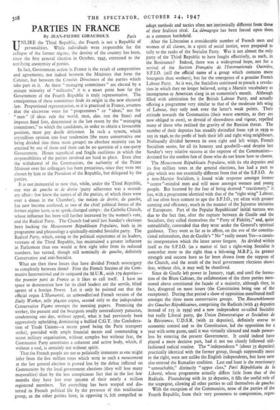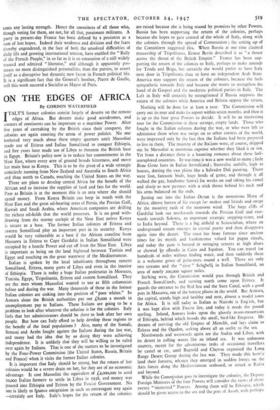PARTIES IN FRANCE
By JEAN-PIERRE GIRAUDOUX Paris UNLIKE the Third Republic, the Fourth is not a Republic of personalities. While individuals were responsible for the collapse of the former regime, the destiny of the country has been, since the first general election. in October, 1945, entrusted to the terrifying anonymity of parties.
In fact, Government action in France is the result of compromises and agreements, not indeed between the Ministers that form the Cabinet, but between the Comites Directeurs of the parties which take part in it. As these " managing committees " are elected by a minute minority of " militants," it is a moot point how far the Government of the Fourth Republic is truly representative. The omnipotence of these committees finds its origin in the new electoral law. Proportional representation, as it is practised in France, assumes that the electorate votes for " programmes " or " ideas," not for " men " (if ideas rule the world, men, alas, run the State) and imposes fixed lists, determined in the last resort by the "managing committees," to which the candidates, in order to obtain a favourable position, must pay docile deference. In such a system, which crystallises opinion into four tendencies (the more conservative one being divided into three main groups) no absolute majority can be attained by any of them and there can be no question of a one-party Government. Hence superficial and fragile coalitions in which the responsibilities of the parties involved are hard to place. Even after the withdrawal of the Communists, the authority of the Prime Minister over his colleagues has been precarious, since they were not chosen by him or the President of the Republic, but delegated by the parties.
It is not immaterial to note that, while, under the Third Republic, one was de gauche or de droite (party adherence was a second- ary affair : few knew the names of all the parties, of which.there were over a dozen in the Chamber), the notion de droite, de gauche, has now become confused, as two of the chief political forces of the former regime have, so to speak, changed camps : the Catholic Church, whose influence has been still further increased by the women's vote, and the Radical Party. The Church had until last Sunday's elections been backing the Mouvement Republicain Populaire, both in its programme and phraseology a spiritually-minded Socialist party. The Radical Party, which, owing to the political experience of its leaders, veterans of the Third Republic, has maintained a greater influence in Parliament than one would at first sight infer from its reduced numbers, has turned, though still nominally de gauche, definitely Conservative and anti-Socialist.
What are then these forces that have divided French sovereignty so completely between them? First the French Section of the Com- munist International and its vanguard the M.U.R., with 179 deputies— the premier parti de France as it likes to call itself. I have no space to demonstrate how far its chief leaders are the servile, blind agents of a foreign Power. Let it only be pointed out that the official organ L'Humanite, an unbowdlerised French version of the Daily Worker, sells 364,000 copies, second only to the independent Conservative Figaro amongst the morning papers. Promising the worker, the peasant and the bourgeois totally contradictory panaceas, condemning one day, without appeal, what it had previously been aggressively upholding, dominating a bullied C.G.T. (the Confedera- tion of Trade Unions—a recent proof being the Paris transport strike), provided with ample financial means and commanding a secret military organisation, without scruples but without fear, the Communist Party constitutes a coherent and active body, which, if without a soul, is certainly not without spirit.
That the French people are not as politically immature as one might infer from the five million votes which went to such a mouvement at the last general election is proved less by the defeat inflicted on Communists by the local government elections (they will lose many mayoralties) than by the less conspicuous fact that in the last few months they have lost over 3oonoo of their nearly a million registered members. Yet everything has been warped and dis- torted in French political life by the presence of this totalitarian group, as the other parties have, in opposing it, felt compelled to adopt methods and tactics often not intrinsically different from those of their Stalinist rival. Lt dbnagogie has been forced upon them as a common battlefield.
After the Liberation a considerable number of French men and women of all classes, in a spirit of social justice, were prepared to rally to the ranks of the Socialist Party. Was it not almost the only party of the Third Republic to have fought effectively, as such, in the Resistance? Indeed, there was a widespread hope, not for a revival of the Section Frangaise de l'Internationale Ouvriere, S.F.I.O. (still the official name of a group which contains more bourgeois than workers), but for the emergence of a genuine French Labour Party. As it was, the Socialists continued to preach a revolu- tion in which they no longer believed, using a Marxist vocabulary as incongruous as American slang in an economist's mouth. Although filled with admiration for the British Labour Party, and actually offering a programme very similar to that of the moderate left wing of Labour, they only took over the latter's weak points. Their attitude towards the Communists (their worst enemies, as they are now obliged to own), so devoid of shrewdness and vigour, repelled many of those who realised the gravity of the Russian threat. The number of their deputies has steadily dwindled from 156 in 1939 to toy in 1946, to the profit of both their left and right wing neighbours. Profoundly divided between its own right and left wings, French Socialism seems, for all its honesty and goodwill—and despite last Sunday's very relative success at the expense of the Communists— destined for the sombre fate of those who do not know how to choose.
The Mouvement Republicain Populaire, with its 162 deputies and its five million votes at the general elections, has had a part to play which was not essentially different from that of the S.F.I.O. As a non-Marxist Socialism, it found wide response amongst former " centre "-minded men and still more amongst women and young people. But haunted by the fear of being deemed " reactionary," it has, with a programme identical with that of the "right wing" Labour, all too often been content to ape the S.F.I.O., yet often with greater cunning and efficiency, much in the manner of the Japanese imitation of Europeans. Part of the Popular Republicans' initial success was due to the fact that, after the rupture between de Gaulle and the Socialists, they called themselves the " Party of Fidelity," and, quite untruthfully, contended that they were under the General's spiritual guidance. They went as far as to affirm, on the eve of the constitu- tional referendum, that de Gaulle's " No " really meant Yes—a casuis- tic interpretation which the latter never forgave. As divided within itself as the S.F.I.O. (as a matter of fact a right-wing Socialist is somewhat more to the right than a left-wing M.R.P.), its greater strength and success have so far been drawn from the support of the Church, and the result of the local government elections shows that, without this, it may well be shortlived.
Since de Gaulle left power in January, 1946, and until the forma- tion of the Blum Cabinet, the collaboration of the three parties men- tioned above constituted the facade of a majority, although they, in fact, disagreed on most issues (the Constitution being one of the exceptions). During that period a show of opposition manifested itself amongst the three more conservative groups. The Rassemblement des Gauches Republicaines, comprising the Radicals (with 43 deputies instead of 115 in 1939) and a new independent so-called Socialist but really Liberal party, the Union Democratique et Socialiste de la Resistance, U.D.S.R. (with 22 deputies), definitely averse to economic control and to the Constitution, led the opposition for a year with some gusto, until it was virtually silenced and made power- less by entering the present Government. It could indeed have played a more decisive part, had it not too closely followed old- fashioned radical routine. The " independents " (about 35 deputies) practically identical with the former group, though supposedly more to the right, were not unlike the English independents, but have now also entered the Ramadier coalition. Last and least is the reactionary " untouchable," distinctly " upper class," Parti Republicain de la Liberte, whose programme actually differs little from that of the Radicals. Floundering with its 32 deputies, it fills the useful role of the scapegoat, allowing all other parties to call themselves de gauche.
With the exception of the Communists, none of the parties of the Fourth Republic, from their very proneness to compromise, repre- Bents any lasting strength. Hence the uneasiness of all those who, though voting for them, are not, for all that, passionate militants. A party in present-day France has been defined by a pessimist as a sum of lost hopes. Indeed their weakness and division and the fears thereby engendered, in the face of both the unsolved difficulties of daily life and growing international tension, have enabled the " Rally of the French People," in so far as it is an emanation of a still widely trusted and admired " liberator," and although it apparently pos- sesses no more distinguished personalities than the parties, to assert itself as a disruptive but dynamic new factor in French political life. It is a significant fact that the General's brother, Pierre de Gaulle, will this week succeed a Socialist as Mayor of Paris.

































 Previous page
Previous page